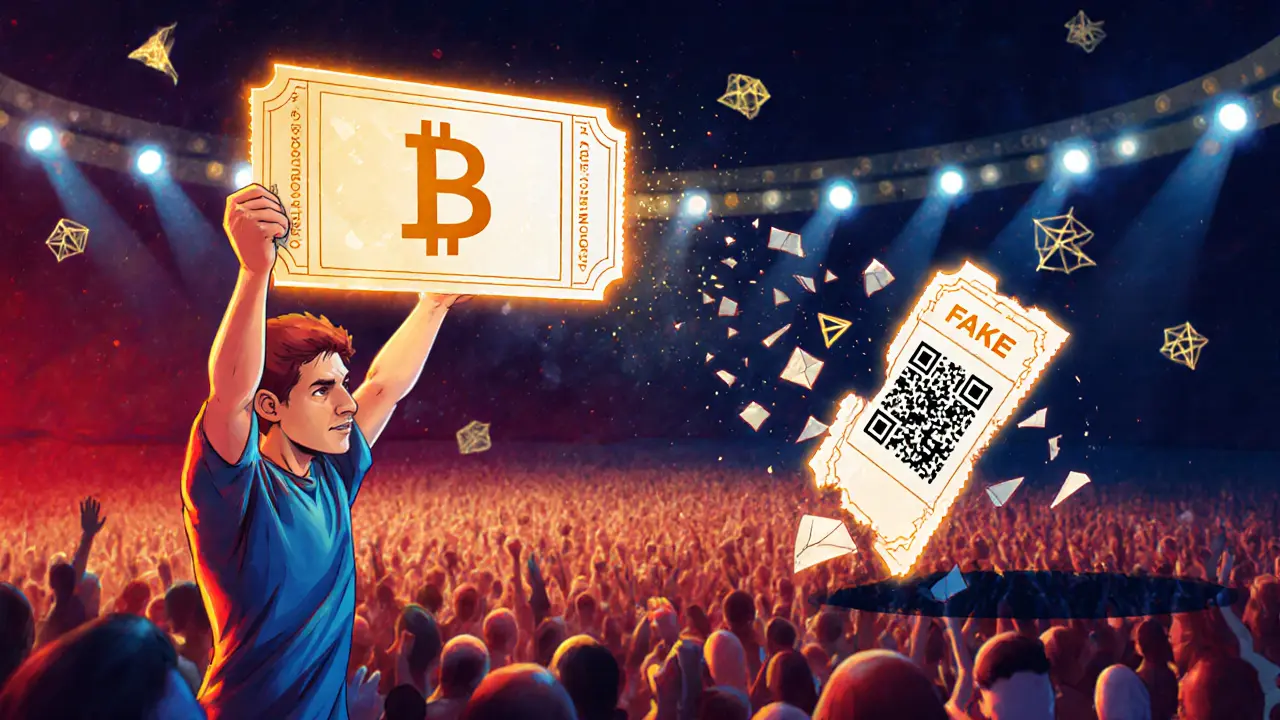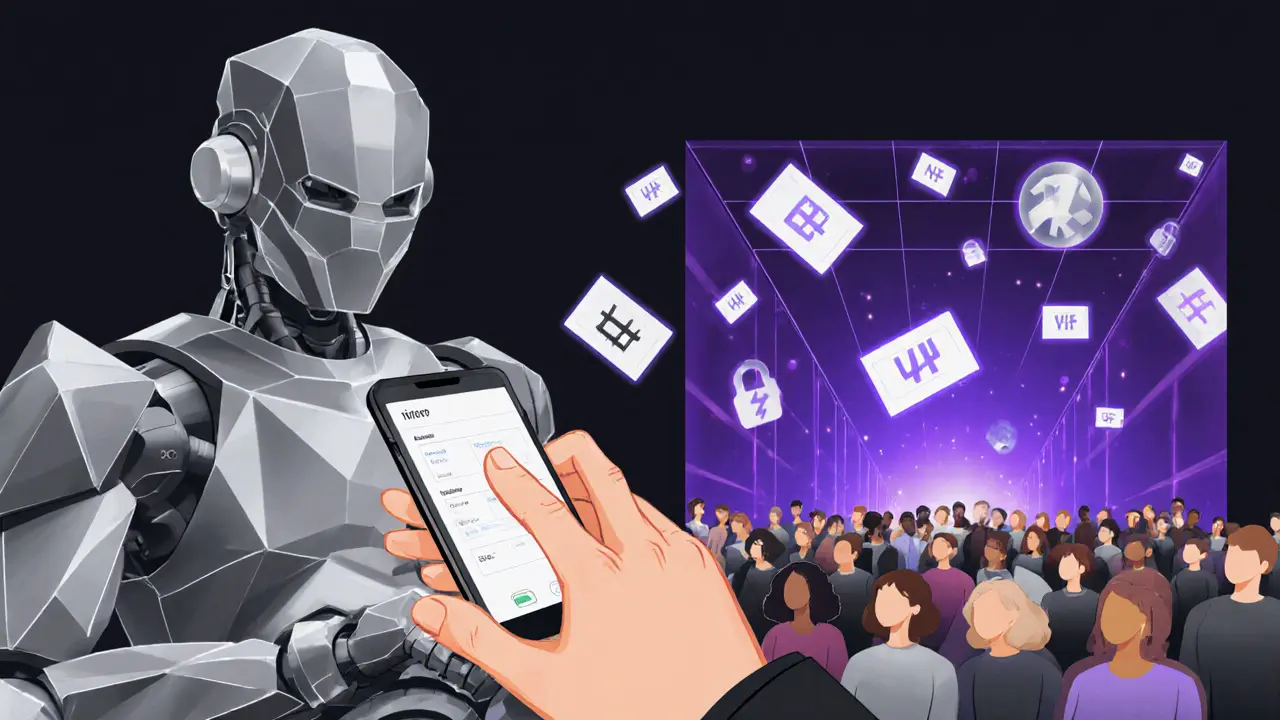NFT Ticket Authenticity Verification: How Blockchain Stops Counterfeit Tickets for Good
 Oct, 11 2025
Oct, 11 2025
NFT Ticket Verification Simulator
Check Ticket Authenticity
Enter a ticket ID to verify authenticity
How This Works
This simulator demonstrates how blockchain verification prevents counterfeit tickets. In real systems:
- 1 Scanners check blockchain ownership in under 1 second
- 2 Smart contracts prevent double-scanning and invalid transfers
- 3 Only tickets with valid ownership history are accepted
Imagine showing up to a sold-out concert, only to have your ticket rejected because it’s fake. This isn’t a rare nightmare-it’s routine. In 2024, over 12 million counterfeit tickets were sold globally, costing fans and organizers more than $1.2 billion. Traditional QR codes and barcodes? Easy to copy. Centralized databases? Easy to hack. But there’s a better way: NFT ticket authenticity verification.
What Makes an NFT Ticket Different
An NFT ticket isn’t just a digital file you download. It’s a unique digital asset stored on a blockchain, like Ethereum. Unlike a PDF ticket or a QR code that just points to a database, an NFT ticket is the proof of ownership. Each one has a unique identifier, a digital fingerprint that can’t be changed or copied. Even if someone screenshots your ticket, they can’t use it. The system checks the blockchain, not a screen.This isn’t magic. It’s code. Smart contracts-self-executing programs on the blockchain-handle everything: who bought it, who owns it now, and whether it’s been used. Once a ticket is scanned at the gate, the smart contract marks it as redeemed. No human can override that. No database can be altered. The record is permanent.
How Verification Works at the Gate
When you arrive at the venue, you don’t need to open an app or show a barcode. You just connect your wallet-MetaMask, Phantom, or any Web3 wallet-to the venue’s scanner. The scanner doesn’t look at your phone screen. It checks the blockchain directly. It asks: “Is this wallet the current owner of this specific NFT ticket? Has it already been used?”Companies like SeatlabNFT have built tools that do this in under a second. The scanner reads the NFT’s metadata-its unique ID, owner history, and event details-and cross-references it with the blockchain. If anything’s off-like a ticket that was sold twice or transferred after the event started-the system flags it instantly. No guesswork. No human error.
And it’s not just about entry. NFT tickets can unlock more than just a seat. They can give you access to VIP lounges, backstage meetups, or exclusive digital collectibles-like a limited-edition video clip or a virtual poster-only if you hold the right NFT. That’s something a paper ticket can never do.
Why Traditional Tickets Fail
Most ticketing systems rely on centralized databases. A company like Ticketmaster or StubHub stores your ticket data on their servers. That’s a single point of failure. Hackers break in. Employees make mistakes. Tickets get duplicated because the system can’t tell if two QR codes are linked to the same original.Even digital tickets with watermarks or encrypted codes can be cloned. All it takes is a good screenshot and a printer. And when tickets get resold on the secondary market, organizers lose control. Scalpers buy up hundreds of tickets, then flip them for triple the price. There’s no way to stop it.
NFT tickets fix this. Because ownership is recorded on the blockchain, every transfer is public and permanent. If someone resells your ticket, you can see exactly who bought it and for how much. And if the event organizer programmed a royalty fee into the smart contract, they get a cut-every single time it’s resold.

Smart Contracts: The Hidden Power Behind the Ticket
The real innovation isn’t the NFT itself. It’s the smart contract. This is the code that runs automatically when certain conditions are met. For example:- If a ticket is resold for more than $200, 15% goes to the artist.
- If the ticket is transferred within 24 hours of the event, it’s automatically blocked.
- If the same NFT is scanned twice, the second attempt is rejected.
These rules are built in before the event even goes on sale. No middleman. No manual review. The system enforces them without anyone having to intervene. That’s how you stop scalping before it starts.
Some platforms even let you set a resale price cap. Say you’re selling a ticket for $150-you can program the contract to only allow resale up to $200. That keeps prices fair and stops predatory flipping.
Real-World Use Cases
NFT ticketing isn’t just theory. It’s live.In 2024, the British rock band Muse used NFT tickets for their European tour. Fans who bought tickets got access to exclusive live recordings and early entry. They also got a share of future merch drops-only if they held the NFT. Sales were 40% higher than their previous tour, and reported fraud dropped to zero.
At the 2025 Edinburgh Music Festival, organizers switched from paper to NFT tickets. Entry lines dropped by 60%. Staff no longer had to check for fake barcodes or call support to verify tickets. The scanners worked offline, synced with the blockchain when back online, and flagged duplicates instantly.
Even sports teams are jumping in. The Scottish Premiership club Hearts FC now offers NFT season tickets. Holders get voting rights on minor club decisions, early access to playoff tickets, and a digital collectible card for each match they attend.

Challenges and Limitations
It’s not perfect. The biggest hurdle? User experience.Not everyone has a crypto wallet. Setting one up can feel intimidating. Some older fans don’t understand private keys or seed phrases. If someone loses their wallet or forgets their password, they lose their ticket-forever. There’s no customer service line to reset it.
Then there’s the issue of used tickets. If a ticket is marked as used on the blockchain, but the scanner doesn’t sync in real-time, someone could hand their phone to a friend and let them sneak in. That’s why top systems use hybrid models: the NFT is the source of truth, but venues use local, offline-capable scanners that sync with the blockchain every 10 seconds to check for redemptions.
Gas fees-the cost to interact with the blockchain-used to be a dealbreaker. But with newer chains like Polygon and Arbitrum, fees are now under $0.01 per transaction. That’s cheaper than printing a paper ticket.
What’s Next for NFT Tickets
The next wave is integration. NFT tickets won’t just get you in-they’ll connect to your identity. Imagine your ticket also verifies your age, your vaccination status (if required), or even your loyalty tier from a past event. All stored securely on-chain, no third-party app needed.Some platforms are testing biometric verification tied to NFTs. You scan your ticket, then your face or fingerprint is checked against a hashed profile stored on the blockchain. No central database of biometric data. No leaks. Just proof you’re the person who bought the ticket.
And as more events go hybrid-part live, part virtual-NFT tickets will unlock digital experiences too. Attend the concert in person? You get the NFT. Watch the livestream? You get a different NFT, with exclusive behind-the-scenes content. Both are verifiable, both are yours to keep.
Final Thoughts: It’s Not About Tech. It’s About Trust
NFT ticketing isn’t about being “blockchain cool.” It’s about fixing a broken system. For years, fans have been ripped off. Organizers have lost money. Trust has eroded.NFT tickets restore that trust. They turn a simple piece of paper into a verifiable, tamper-proof asset. They give fans control. They give organizers revenue. They eliminate fraud at its root.
You don’t need to understand Ethereum. You don’t need to trade crypto. You just need to know this: if you’re buying a ticket for something important-a concert, a game, a conference-ask if it’s an NFT. If it’s not, you’re still playing Russian roulette with your money.
Can I still use a traditional ticket if an event offers NFT tickets?
No. If an event is fully NFT-based, traditional tickets won’t work. The entry system is built to verify only blockchain-based tokens. Some events may offer hybrid options during a transition phase, but by 2025, most major organizers have moved fully to NFTs for security and control.
What happens if I lose my wallet or private key?
If you lose access to your wallet, you lose your ticket. There is no recovery option built into the blockchain. This is why it’s critical to back up your seed phrase securely-on paper, not in a digital file. Some platforms now offer recovery services through trusted custodians, but these are optional and come with fees. Always treat your wallet like your house keys.
Are NFT tickets more expensive than regular tickets?
No. The base price is the same. The only extra cost is a tiny blockchain transaction fee-usually less than a penny. Some platforms may charge a small service fee for wallet setup, but that’s optional. In fact, because NFT tickets reduce fraud and scalping, organizers often lower prices or add perks instead of raising them.
Can I resell my NFT ticket for any price?
Only if the event organizer allows it. Smart contracts can set resale limits-like a maximum price or a required royalty payment to the original seller. Some events block resale entirely. Others let you sell at market price, but take 10% to 20% as a fee. Always check the ticket’s smart contract terms before buying.
Do I need cryptocurrency to buy an NFT ticket?
No. Most NFT ticket platforms now accept credit cards, Apple Pay, or Google Pay. The crypto part happens behind the scenes. You buy with your card, and the system automatically converts it into ETH or another token to mint the NFT in your wallet. You never see the crypto unless you want to.
Hanna Kruizinga
November 1, 2025 AT 02:14This is just another way for big tech to track you. They’re not stopping fraud-they’re building a digital ID system so they can control who gets into what. Next thing you know, your ticket will auto-delete if you sneeze wrong. I’m not downloading some crypto wallet for a concert. No thanks.
David James
November 1, 2025 AT 06:53im not techy but this sounds cool. like, if my ticket cant be copied then its safer right? i just want to get in without some guy selling fake ones on instagram. also, i heard you can get free merch if you hold the nft? thats kinda sweet lol
Shaunn Graves
November 2, 2025 AT 12:22So let me get this straight-you’re telling me we’re replacing a system that’s been fine for decades with something that requires me to memorize a 12-word phrase I can’t recover if I typo it? And you call this progress? I’ve seen people lose their wallets and get locked out of their own tickets. This isn’t innovation. It’s a security nightmare wrapped in blockchain buzzwords. The real fraud is selling this as a solution.
Josh Serum
November 3, 2025 AT 13:52You know what’s wild? People are scared of a system that actually works. I’ve been to concerts where I got stuck in line for 45 minutes because the QR code didn’t scan. Then I saw a friend get denied entry because the system said ‘duplicate ticket’-turns out, his cousin bought the same one from a sketchy site. With NFTs? No duplicates. No lies. No excuses. You don’t need to understand Ethereum to trust it. You just need to trust that your money isn’t getting stolen. And honestly? That’s more than you can say for Ticketmaster.
Vicki Fletcher
November 4, 2025 AT 16:48I love the idea… but… what if… I mean… what if I accidentally delete my wallet? Or… like… I forget my password? Or… someone hacks my phone? And then I miss the show? And there’s no… customer service? No… refund? No… anything? It just… disappears? Like… forever? I don’t think I’m ready for that kind of responsibility…
Nadiya Edwards
November 5, 2025 AT 02:35They say NFTs are about ownership-but really, they’re about control. Who owns the blockchain? Who controls the smart contracts? Big corporations. The same ones who’ve been ripping you off for years. This isn’t freedom-it’s a gilded cage with a crypto lock. And don’t tell me about ‘lower fees’-you think they’re not going to charge you for ‘wallet maintenance’ next year? This is the same scam, just with more jargon.
Ron Cassel
November 5, 2025 AT 19:35Let’s be real: if you’re not using crypto, you’re not in the game. This isn’t about convenience-it’s about the future. The government’s already tracking your purchases. Banks are spying on your spending. And now you’re gonna whine because you have to use a wallet to get into a concert? Wake up. The world’s moving on. You either adapt or get left behind. And honestly? You deserve to get locked out if you can’t handle it.
Malinda Black
November 6, 2025 AT 17:41For anyone new to this-don’t panic. Wallets are easier than they seem. There are guides everywhere. Some platforms even let you link your email to a backup. And if you’re nervous, start small-buy one ticket for a local show. See how it feels. The tech isn’t scary. The fear is what’s being sold to you. You’re not being asked to become a crypto expert. You’re just being asked to hold something that can’t be stolen. That’s not hard. That’s smart.
ISAH Isah
November 7, 2025 AT 11:05Chris Strife
November 8, 2025 AT 08:09They say NFTs stop fraud. But let’s not pretend this isn’t just another way to extract money. The artists get a cut. The platform gets a cut. The wallet provider gets a cut. Who’s getting the cut from the fans? Us. We’re the ones who have to learn this crap. And when it fails? We’re the ones stuck outside. This isn’t progress. It’s a tax on trust.
Mehak Sharma
November 10, 2025 AT 02:37Imagine this: you buy a ticket and it unlocks a secret song only you can hear. Or you get a digital autograph from the band that only your NFT can access. Or your ticket becomes a piece of art you can display in your virtual home. This isn’t just entry-it’s legacy. And yes, it’s weird at first. But so was streaming music. So was online shopping. We adapt. We grow. The future isn’t paper. It’s persistent. It’s yours. And it’s beautiful.
bob marley
November 11, 2025 AT 02:15Oh wow. A ticket that can’t be faked. How revolutionary. Next you’ll tell me water is wet and gravity isn’t a hoax. I’ve been to 50 concerts. Never got scammed. But hey, let’s throw away the whole system because some dude on Reddit thinks he’s a blockchain guru. I’ll stick with my $30 paper ticket and my $200 beer. Thanks, but no thanks.
Jeremy Jaramillo
November 12, 2025 AT 02:16I get why people are nervous. Change is scary. But this isn’t about forcing anyone to be tech-savvy. It’s about giving people real protection. No more fake tickets. No more scalpers. No more lost receipts. I’ve seen families cry because they spent their last money on a fake ticket. This system fixes that. It’s not perfect. But it’s better. And that’s worth trying.
Sammy Krigs
November 12, 2025 AT 13:20i just tried to set up a wallet and i think i lost my money. i clicked the wrong button and now my phone says ‘invalid transaction’. i dont even know what that means. can someone help? i just wanted to see blink 182.
naveen kumar
November 12, 2025 AT 22:42Bruce Bynum
November 14, 2025 AT 19:50Simple. No fake tickets. No scalpers. No lines. Faster entry. Extra perks. Tiny fee. That’s it. You don’t need to know how it works. You just need to know it works better. Try it once. You’ll get it.
Wesley Grimm
November 14, 2025 AT 21:39Let’s analyze the data: 12 million counterfeit tickets in 2024. That’s 0.00003% of global population. NFT adoption is under 5%. The cost of infrastructure rollout? Millions. The reduction in fraud? Unverified. The user friction? Catastrophic. This isn’t a solution. It’s a vanity project for tech bros who think blockchain fixes everything. The real problem? Poor regulation and enforcement. Not crypto.
Masechaba Setona
November 16, 2025 AT 01:37So… you’re saying I have to trust a computer more than a person? 😅 And if I lose my key… I’m just… out? No refunds? No help? No second chances? That’s not innovation. That’s cruelty. And you call this ‘trust’? Nah. This is just another way to make the rich richer and the confused… homeless. 🤷♀️
Kymberley Sant
November 16, 2025 AT 18:04im not saying its bad but i tried to buy one and the site kept saying ‘insufficent funds’ and i had 500 bucks in my bank?? what even is this?? i just wanted to see ed sheeran 😭
David James
November 17, 2025 AT 11:19wait so if i buy the nft ticket and resell it, the band gets a cut? that’s actually kinda fair. i never thought about that. i’d be cool with that if it means they get paid more. i’d even pay a little extra for that.